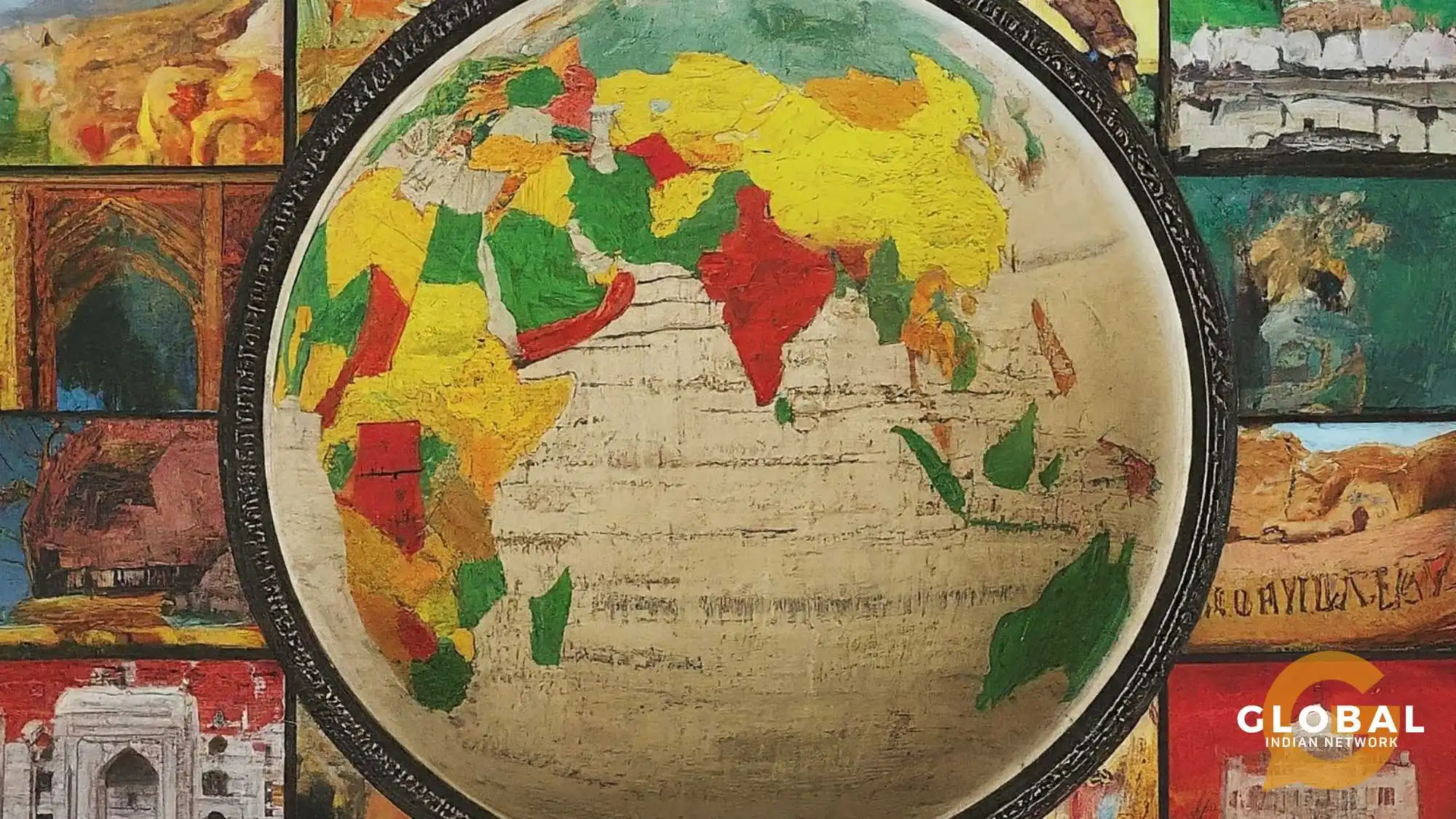What is a world that does not celebrate diversity and heritage?
Since time immemorial, our planet has been home to countless civilizations, each contributing unique cultures, religions, and traditions. Imagine a world devoid of the shades of diversity, a canvas painted with a single, monotonous colour. That is the picture of a reality where history, heritage, culture and identity are not celebrated.
Heritage is more than a legacy; it forms the foundation of our perception of identity, offering us a sense of belonging and continuity. Our heritage is the cornerstone upon which we build our understanding of ourselves and the world around us. Embracing our heritage enriches our lives, fostering respect, understanding, and unity in an ever-evolving world.
One such celebration is South Asian Heritage Month, which acknowledges and celebrates the role of South Asian heritage in our collective identity, shaping our present and urging us to cherish and preserve the histories and experiences that define who we are.

Table of Contents
What is the South Asian Heritage Month All About?
South Asian Heritage Month celebrates the rich and diverse cultures, histories, and contributions of people with roots in South Asia. Held annually from July 18th to August 17th, this month-long celebration highlights communities from India, Pakistan, Bangladesh, Sri Lanka, Nepal, Bhutan, Afghanistan, and the Maldives.
The South Asian community in the UK comprises roughly 5 million people, representing 7.5% of the total British populace. The month aims to commemorate the history and experiences of South Asian communities, marking their significant contributions to British society. It celebrates the vibrant cultures, languages, and traditions that have enriched the global cultural landscape. By honouring the diverse heritage of South Asia, we recognize the unique identities and narratives that have shaped our present world.
South Asian Heritage Month encourages us to explore the stories of resilience, creativity, and innovation that define these communities. It fosters a deeper understanding and appreciation of the cultural diversity that enhances our shared human experience. Through this celebration, we embrace the beauty of our multicultural world and the powerful legacy of South Asian heritage.
South Asian Heritage Month is celebrated with a variety of events and activities, including music and dance performances, art exhibitions, film screenings, and fashion shows showcasing South Asian culture. Educational events like historical talks, literary festivals, and workshops explore the region’s rich heritage. Community events such as food festivals, cultural fairs, and gatherings foster connection and celebration. Additionally, online celebrations feature virtual exhibitions, social media campaigns, and interactive workshops, making the festivities accessible to a wider audience.

The History of South Asian Heritage Month
South Asian Heritage Month is a relatively recent initiative rooted in the rich and complex history between South Asia and the United Kingdom. This month-long celebration is chosen for significant historical reasons. July 18th marks the day in 1947 when the Indian Independence Act received royal assent from King George VI, leading to the partition of India and the creation of Pakistan. August 17th is the anniversary of the publication of the Radcliffe Line in 1947, which determined the borders between India, West Pakistan, and East Pakistan (now Bangladesh). These dates symbolize the crucial point in history when South Asia transitioned from British colonial rule to independent nations.
The movement to establish South Asian Heritage Month gained momentum in the UK as a response to the growing recognition of the substantial contributions made by South Asian communities to British society, culture, and economy.
This movement includes highlighting the diverse and vibrant cultures of South Asia, acknowledging the challenges and experiences of South Asian immigrants, and promoting understanding and respect between different communities. South Asian Heritage Month was established as an observance for celebrating and sharing South Asian heritage through the efforts of various organizations such as the South Asian Heritage Trust, The Grand Trunk Project, The Partition Commemoration Campaign, the City Sikhs and Faiths Forum for London, and individuals.
The Global Indian Network is another noteworthy platform that is working to bring to light stories and issues pertaining to the South Asian diaspora, among many other initiatives, by changing the world one conversation at a time.
The Question of Identity
The South Asian diaspora, spread across continents, finds itself at a crossroads when it comes to cultural heritage and adopted homelands. This often leads to the quest for identity, or in worst cases, fractured identities in a globalized world. Where does one truly belong? How does one reconcile the traditions of the past with the demands of the present?
The question of identity is further complicated by external perceptions. Stereotypes and generalizations often overshadow individual experiences, leading to a sense of alienation and a struggle to be seen as a multifaceted individual rather than a cultural archetype.
In recent times, identity has become increasingly politicized, with discussions around immigration, multiculturalism, and national belonging often fraught with tension. South Asian communities find themselves at the intersection of these debates, facing pressures to assimilate while also preserving their cultural heritage. This delicate balancing act can be both challenging and rewarding.

The Multifaceted Identity of South Asians
South Asians often find themselves navigating a complex interplay of stereotypes, contributions, and media representations. Generalizations about arranged marriages, call center jobs, or inherent mathematical prowess continue to overshadow the rich history behind their identities.
However, South Asians have made indelible marks across various fields. From pioneering scientists like Sir C.V. Raman to literary giants like Rabindranath Tagore, their contributions to science, literature, and philosophy are undeniable. In arts and culture, South Asian music, dance, and film have captivated global audiences, showcasing the creative potential of the region.
The media plays a significant role in constructing and reinforcing perceptions of South Asian communities. While there has been progress in representing diverse South Asian characters, stereotypes still persist (Apu Nahasapeemapetilon from The Simpsons is a classic example). Overcoming these challenges requires a joint effort to showcase the multifaceted nature of South Asian identities, celebrating their achievements while acknowledging the complexities of their experiences.
Contributions of South Asian Communities to Global Society
South Asian communities have made significant and enduring contributions to global society, shaping the world in countless ways. From ancient times to the present day, their impact has been felt across various fields.
Historically, South Asia was a cradle of civilization, with contributions to mathematics, astronomy, philosophy, and medicine. Figures like Aryabhata, the mathematician and astronomer, and Charaka, the father of Indian medicine, are proof of this intellectual prowess. The region’s rich literary and artistic traditions, exemplified by the epic poems of the Mahabharata and Ramayana, have had an ever-lasting influence on global storytelling and culture.
In the modern era, South Asians continue to excel in diverse fields. Their contributions have particularly transformed the technology industry, with individuals like Sundar Pichai, CEO of Google, a leading global tech giant. South Asian doctors, engineers, and scientists are at the forefront of medical research, technological innovation, and space exploration. Moreover, South Asian artists, musicians, and writers have captivated global audiences, enriching the cultural landscape.
The impact of South Asian communities is particularly evident in countries like the UK, where they have made significant contributions to various sectors. The NHS, for example, has benefited immensely from the expertise of South Asian doctors and nurses. South Asian entrepreneurs have established successful businesses, creating jobs and boosting the economy. Additionally, South Asian communities have enriched British culture through their
food, fashion, and festivals, fostering a more vibrant and diverse society.
These examples merely scratch the surface of the vast and multifaceted contributions made by South Asian communities to the world. Their legacy continues to inspire and shape the global landscape.

Challenges and Triumphs: The South Asian Experience
The South Asian diaspora has undeniably enriched the fabric of societies worldwide. However, their journey has been punctuated by challenges. From the initial hurdles of immigration to the ongoing battle against racism and discrimination, South Asian communities have shown remarkable resilience. Stereotypes, often rooted in ignorance, have hindered their progress, but these communities have consistently defied expectations. Their achievements not only inspire future generations but also contribute to dismantling harmful stereotypes.
Unity and empowerment are essential for addressing the challenges faced by South Asian communities. Individuals can amplify their voices, advocate for their rights, and create a supportive network by coming together. Building strong communities can go a long way in preserving cultural heritage, fostering economic growth, and ensuring the well-being of future generations.
Preserving South Asian Heritage, Building the Future
South Asian communities are actively engaged in safeguarding their rich linguistic, cultural, and traditional heritage.
Language preservation initiatives, such as those focused on endangered languages like Sanskrit and various dialects, are gaining momentum. Additionally, efforts to document oral histories, traditional crafts, and performing arts are crucial in preserving these invaluable assets for posterity.
Younger generations are spearheading this endeavour. Social media platforms have become powerful tools for sharing cultural heritage, with young people creating content that celebrates their roots. For instance, the rise of Desi influencers has brought South Asian culture into the mainstream, inspiring pride and belonging among the youth. Moreover, their engagement in interfaith dialogues and volunteering for social causes demonstrates their commitment to building bridges and creating a more inclusive society.

South Asian Heritage in the Context of Current Affairs
South Asian communities are at the heart of many contemporary global issues. Recent events, such as the COVID-19 pandemic, have disproportionately impacted these communities, highlighting existing inequalities and vulnerabilities. The pandemic exposed disparities in healthcare access, economic stability, and the digital divide, with South Asian communities often bearing the brunt of these challenges.
South Asian heritage plays a crucial role in contemporary social and political movements. The region’s rich history of activism and resistance against oppression has inspired many. For instance, the legacy of Mahatma Gandhi‘s nonviolent resistance continues to influence peace movements worldwide. Today, South Asian communities are at the forefront of various social justice movements, advocating for climate justice, racial equality, and LGBTQ+ rights.
Countless individuals are making a significant difference. Malala Yousafzai, a Nobel Peace Prize laureate, is a global icon for her advocacy of girls’ education. Rishi Sunak, the first British Prime Minister of Indian descent, represents a milestone in political representation. In fields like science and technology, South Asian innovators are developing solutions to pressing global challenges. These individuals, among many others, exemplify the resilience and leadership of South Asian communities on the world stage.
Conclusion
Not acknowledging and celebrating heritage would be disregarding our collective history and the endurance of our ancestors. This diversity and rich heritage have not only shaped the present (the good and the bad) we are experiencing right now but also hold the key to a future full of possibilities. South Asian Heritage Month is an appreciation of the threads that have woven the fabric of our shared human experience. It is within these traditions, cultures, and stories that we discover the roots of our identity, fostering a deep sense of belonging and connection to something greater than ourselves because, let’s face it, what would our world be if we did not celebrate diversity and heritage?











[…] nation has a highly ethnically diverse population of South Asians, Creoles, Javanese, African, Chinese, Indian, and Dutch descent. Suriname's economy relies on its […]
[…] brown culture could have been so much more. But another factor to be considered is that most of the South Asians who make or participate in these shows are children of immigrants. They are not in touch with how […]